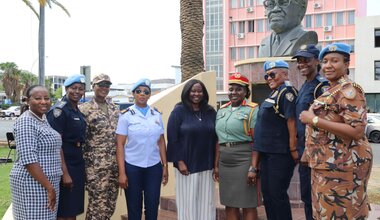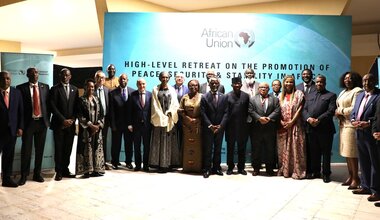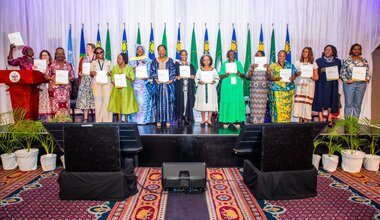Remarks delivered by SRSG Parfait Onanga-Anyanga on the cooperation between the UN and the AU, Security Council, 9739th meeting
Briefing delivered by Parfait Onanga-Anyanga
Special Representative of the Secretary-General to the
African Union and Head of UNOAU
United Nations Security Council Meeting on
‘Cooperation between the United Nations and Regional Organizations including The African Union’
2 October 2024
Your Excellency, Madam President of the Security Council,
Your Excellencies, Distinguished Members of the Security Council,
Your Excellency, Ambassador Bankole Adeoye, AU Commissioner for Political Affairs, Peace and Security,
Assistant Secretary-General, Martha Ama Pobee,
Ladies and Gentlemen,
Thank you, Madam the President of the Security Council, for convening this important meeting on ‘Cooperation between the United Nations and regional organizations, including the African Union’ amidst heightened global tensions that require the full attention of this Council.
The report of the Secretary-General (S/2024/629) on ‘Strengthening the partnership between the United Nations and the African Union on issues of peace and security in Africa, including the work of the United Nations Office to the African Union’ provides an update on the key achievements and milestones in the strategic partnership between the United Nations and the African Union on issues of peace and security in Africa.
It also outlines the serious challenges to peace and security across the continent; and underscores the strategic importance - and indeed necessity - of the partnership between the United Nations and the African Union. This strategic partnership continues to grow from strength to strength.
We commend the Security Council and the AU Peace and Security Council (AUPSC) for prioritizing collaboration and information-sharing. We welcome the constructive and cordial deliberations at the last Informal Seminar and Annual Joint Consultative Meeting of the two Councils, held a year ago in Addis Ababa; and look forward to an equally productive meeting in two week’s time, under the joint leadership of Switzerland and Egypt.
During the reporting period, the two Councils have also significantly increased the frequency of the monthly informal coordination meetings between the incoming President of the Security Council and incoming Chairperson of the AUPSC, providing opportunities for enhancing synergies and complementarity. We also recognize the important role of the three African members of the Security Council (A3) who provide a critical link between the two Councils.
Special representatives and envoys of the United Nations and the African Union, and other senior officials, frequently brief the two Councils, sometimes jointly, offering critical insights and analysis to inform decision-making. During the reporting period, UNOAU and other United Nations entities also briefed the Peace and Security Council on at least 30 occasions, including at meetings held at the level of Heads of State and Government.
The two organizations also continue to meet in both formal and informal settings, to share information and analysis, and to coordinate responses to Africa’s peace and security challenges across the conflict cycle. . This includes the Annual Conference and other frequent meetings between the Secretary-General and the Chairperson of the AU Commission, the High-level strategic dialogues co-chaired by the Deputy Secretary-General and the Deputy Chairperson of the Commission, meetings of the Joint UN-AU Taskforce on Peace and Security, and the joint retreat of UN and AU Special Representatives and Envoys in Africa.
Staff-level collaboration between the two organizations continues to be a major feature of the UN-AU partnership, allowing for joint analysis and planning, a recent example being the preparations for the successor arrangements for ATMIS and the joint consultations to unpack resolution 2719, on which ASG Pobee will shortly provide an update on the operationalization process. Moreover, following the decision of African Heads of State and Government to establish the Africa Facility to Support Inclusive Transitions (AFSIT), the United Nations and the African Union are closely coordinating efforts to help address complex political transitions facing several countries.
The foregoing, though not exhaustive, shows the effectiveness, dynamism, and wide-ranging nature of UN-AU partnership.
Madam President, Excellencies,
As the Council is aware, several African countries and sub-regions continue to face significant challenges to achieving lasting peace, security and sustainable development.
The Horn of Africa continues to be confronted with several destabilizing conflicts driven by political instability, territorial disputes and an ever-worsening humanitarian situation. The AU-IGAD-UN collaboration in responding to these challenges remains essential for sustainable peace in the region.
The conflict in Sudan has resulted in a grave humanitarian emergency, leading to the largest forced displacement crisis in the world involving over 10 million people, of which more than 2 million have fled to neighbouring countries. We commend the sustained diplomatic efforts in recent months to end this deadly conflict. The AUC-led Expanded Mechanism continues to be a useful coordination platform for joint messaging to the belligerents to prioritise inclusive civilian-led political solutions and to silence the guns.
In the Sahel region, political instability and violence have intensified, while uncertainty characterizes transition processes in Burkina Faso, Guinea, Mali, and Niger. Burkina Faso, Mali and Niger have decided to withdraw their membership of the Economic Community of West African States (ECOWAS) and to establish a new Alliance of Sahel States. The United Nations and African Union are working to enhance their collective support in advancing democratic transitions in the region, working closely with ECOWAS.
More broadly, we welcome the informal engagements between the AUPSC and the countries in political transitions aiming at facilitating their return to constitutional order, including recently in Gabon.
In the Great Lakes region, the 30 July ceasefire agreement between the Democratic Republic of the Congo and Rwanda, facilitated by Angola, has translated into a reduction of fighting between conflict parties in North Kivu. I wish to commend President João Lourenço of Angola for his steadfast efforts through the Luanda process to restore peace and security in eastern Democratic Republic of the Congo. Continued regional and international support is crucial to sustain this milestone. We must remain attentive to the suffering of the civilian population who continue to face atrocities by armed groups and are forced to leave their homes. All groups must lay down their weapons and disarm. The commitment of the member States of the Southern African Development Community (SADC) to support peace efforts through the deployment of the SADC Mission in the Democratic Republic of the Congo (SAMIDRC) is also commendable. The United Nations, through resolution 2746 (2024), and the African Union have reiterated their commitment to support these efforts. For sustainable peace to be restored in eastern Democratic Republic of the Congo and the region, addressing the root causes, including through political initiatives such as the Luanda and the Nairobi processes and the quadripartite process facilitated by the African Union, is a sine qua non.
Madame la Présidente, Excellences, Mesdames et Messieurs,
Le lien entre le changement climatique, la paix et la sécurité est une réalité indéniable en Afrique. L’impact du changement climatique met à rude épreuve la résilience d'États déjà fragilisés, tout en exposant des lacunes en matière d'adaptation, ainsi que l’inadéquation de la réponse.
Dans ce contexte, il faut se féliciter des avancées significatives enregistrées par les Etats africains, comme récemment à Nairobi, où le processus visant à formuler une Position Commune Africaine sur le Climat, la Paix et la Sécurité a été finalisé.
La mise en place récente d’un Centre sur le climat, la paix et la sécurité pour la Corne de l'Afrique par les Nations Unies permettra de mieux soutenir les efforts de l'Autorité intergouvernementale sur le développement (IGAD), à travers un partenariat élargi intégrant l'Union africaine. Le déploiement imminent d'un conseiller en climat, paix et sécurité au sein de l'UNOAU, rendu possible grâce au Mécanisme de sécurité climatique, jouera également un rôle clé dans l'approfondissement de la coopération avec l’UA dans ce domaine.
Concernant l’Agenda femmes, paix et sécurité, les Nations Unies continuent de collaborer étroitement avec la Commission de l'Union africaine, notamment dans la promotion du leadership féminin et sur la convention de l'Union africaine pour mettre fin à la violence à l'encontre des femmes et des filles, ainsi que sur les objectifs de parité de genre dans les processus de médiation dirigés par l'Union africaine.
Madame la Présidente, Excellences, Mesdames et Messieurs,
Le partenariat entre les Nations Unies et l'Union africaine tire sa dynamisme d'un engagement partagé et durable en faveur du multilatéralisme. Le Secrétaire général a raison de voir dans ce partenariat la pierre angulaire d'un multilatéralisme efficace et indispensable pour relever les défis complexes de notre époque.
La réunion d'aujourd'hui se déroulant 10 jours seulement après l'adoption du "Pacte pour l'avenir" qui, entre autres, s'engage à "Renforcer la coopération entre les Nations Unies et les organisations régionales, … dans le maintien de la paix et de la sécurité internationales …”, permettez-moi du reste, de féliciter tous les États membres pour leur engagement et de saluer, en particulier, la contribution essentielle du Groupe africain, avec le soutien assuré de la Commission de l'UA. Cela réaffirme le rôle crucial de l'Afrique dans la promotion d'un système multilatéral efficace, juste et inclusif.
Madam President, Excellencies, Ladies and Gentlemen,
Allow me, to make a few closing comments.
In spite of all the daunting challenges Africa still faces, there are reasons to remain optimistic. We can indeed build on the virtuous cycle of encouraging developments that are sparking a greater sense of hope in better outcomes. These include Africa’s resilient people and resourceful women and youth, their stated preference for democratic rule against all odds, the recently gained G20 membership, the newly adopted Pact for the Future in furtherance of a networked and more effective multilateral system, just to mention a few.
Knowing the special attention this Council gives to Africa, I have every reason to believe that we will all chose hope over despair, and rally around a partnership that is purposeful, smarter and grounded in a fairer global environment which can better support a genuine African renaissance.
Finally, I would like to take this opportunity to pay special tribute to the African Union Commission, particularly Chairperson Moussa Faki Mahamat, for his wise leadership and his dedication to the UN-AU partnership, for which Commissioner Bankole Adeoye has also been instrumental. In this leadership team, the United Nations has greatly benefitted from a dependable and like-minded partner in pursuit of the shared aspiration to build an enduring strategic and institutionalized partnership between our two organizations. As Chairperson Moussa Faki Mahamat nears the end of his term of office, I wish to renew my sincere gratitude for his steadfast support over the years and convey to him my very best wishes for the future.
I thank you for your kind attention.
 UN
UN






